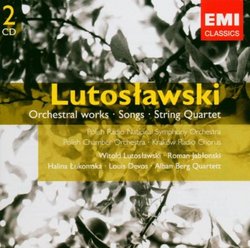| All Artists: Witold Lutoslawski, Polish Radio Chamber Orchestra, Polish Radio Symphony Orchestra, Halina Lukomska, Louis Devos Title: Lutoslawski: Orchestral Works; Songs; String Quartet Members Wishing: 0 Total Copies: 0 Label: EMI Classics Release Date: 8/10/2004 Album Type: Original recording remastered Genres: Pop, Classical Styles: Vocal Pop, Opera & Classical Vocal, Chamber Music, Forms & Genres, Concertos, Historical Periods, Modern, 20th, & 21st Century, Instruments, Strings, Symphonies Number of Discs: 1 SwapaCD Credits: 1 UPC: 724358577327 |
Search - Witold Lutoslawski, Polish Radio Chamber Orchestra, Polish Radio Symphony Orchestra :: Lutoslawski: Orchestral Works; Songs; String Quartet
 | Witold Lutoslawski, Polish Radio Chamber Orchestra, Polish Radio Symphony Orchestra Lutoslawski: Orchestral Works; Songs; String Quartet Genres: Pop, Classical
|
Larger Image |
CD Details |
CD ReviewsTwo discs of fine, lesser-known Lutoslawski R. Hutchinson | a world ruled by fossil fuels and fossil minds | 06/21/2005 (5 out of 5 stars) "This is a great 2-disc set, part of EMI's Gemini series. Everything here was recorded in Poland in 1976 and 1977, and all feature Lutoslawski himself conducting the Polish Radio National Symphony Orchestra (or Polish Chamber Orchestra), except the "String Quartet," which was recorded in 1997. I strongly recommend it (especially at the price!) to anyone who has heard THE ESSENTIAL LUTOSLAWSKI (see my review) and wants to hear more.
The first disc opens with "Preludes and Fugue for 13 solo strings" (1972 -- 33'32). A complex work that will sound forbidding to many, it is constructed from six lines (cantabile, grazioso, lamentoso, misterioso, estatico and furioso) bundled into seven interlocked preludes and an extended fugue. Then follow two vocal works, which are quite accessible and appealing -- "Trois poemes d'Henri Michaux" (1963 -- 20'11) for twenty-part all female choir and orchestra, and "Paroles tissees" (1965 -- 13'51) featuring the tenor Louis Devos. "Trois poems" includes some of the wildest, funniest passages I've heard from Lutoslawski, while the tenor piece, which evokes medieval love poetry, is one of the warmest and most moving. The first disc ends with "Postlude No. 1" (1958 -- 4'03), a very impressive orchestral work. It makes you wish for more, but apparently Lutoslawski was dissatisfied with No.s 2 and 3. The second disc opens with another vocal work, "5 Songs for soprano and orchestra" (1957 -- 9'59), with the topics 1) The Sea, 2) Wind, 3) Winter, 4) Knights and 5) Church Bells. My one criticism of this fine set is that there is no text provided for the songs. All three vocal works are highly evocative, and are effective on a musical level regardless, and I suppose I shouldn't complain given that this is the Gemini budget series. The last two works are not Lutoslawski's best, but these are the best performances of them that I've heard. The "Cello Concerto" (1970 -- 22'20) was written for Msistislav Rostropovich, who recorded it for EMI. Roman Jablonski is the cellist here, and he and the Polish orchestra are far more convincing than the version recorded a few years later with Heinrich Schiff on cello, and Lutoslawski conducting a German orchestra (that recording is found on THE ESSENTIAL LUTOSLAWSKI, on Philips). The form, pitting the soloist against the orchestra, is standard, and I find the cumulative effect underwhelming, though again, the performance is committed. Finally, the "String Quartet" (1964 -- 23'16) is here performed by the Alban Berg Quartet. This is a much better interpretation than the Arditti Quartet's (on KURTAG LUTOSLAWSKI GUBAIDULINA on Montaigne -- see my review), and I'm convinced that it's because of the ABQ's immersion in the classical repertoire. (I haven't heard the Kronos recording.) There are four sections, a long, slow opening movement which includes an element of improvisation and sounds gently chaotic, then a second movement that begins fast and agitated, culminating in an outburst which is followed by a sad, mournful, elegiac passage, and then a calm coda which returns to the sound of the first movement. Comparing the two versions, the ABQ's is warmer, and conveys the contrast between sections much more strongly than the Arditti Quartet, which plays the first movement with an edgier tone that undercuts the dramatic shift to the second movement. That contrast is further evidence for my view that Lutoslawski was not at his best when he strayed the furthest into avant forms (ie, Symphonies 2 and 3, the String Quartet). I would place Lutoslawski alongside Dutilleux as one of the loveliest, not the most radical, of late 20th century composers. When he stayed closer to the classical tradition, extending Bartok and Debussy rather than competing with the Darmstadt Circle, Lutoslawski found his uniquely beautiful voice, as the best works on this disc demonstrate fantastically." |

 Track Listings (7) - Disc #1
Track Listings (7) - Disc #1